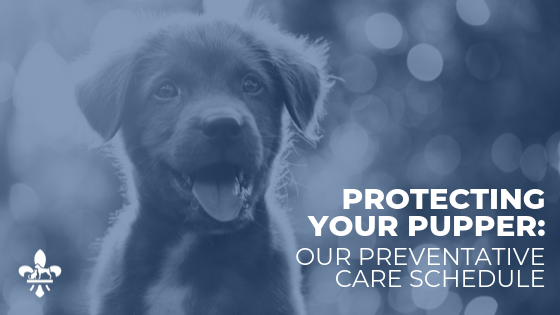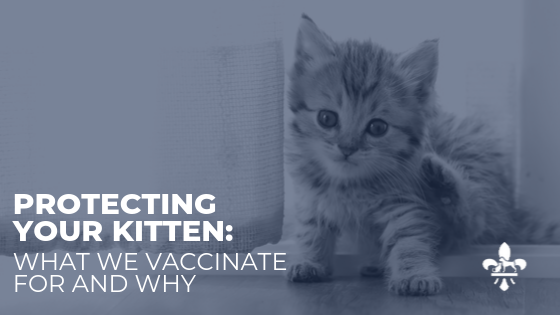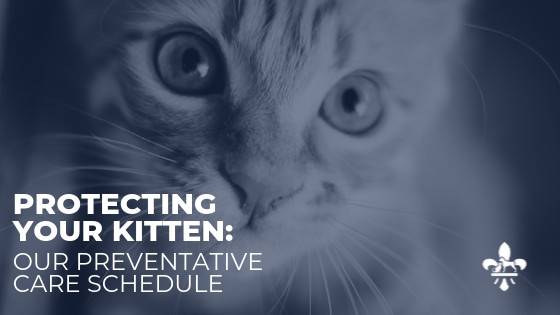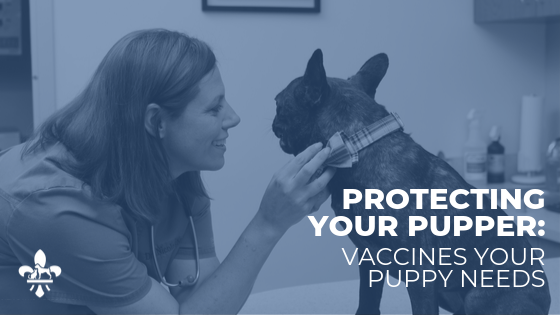|
Our veterinarians will work with you to determine what vaccines and preventative care schedule is best for your puppy, based on their age, breed and lifestyle. In general, our hospital follows the American Animal Hospital Association (AAHA)’s most recent canine vaccination guidelines to help provide a solid foundation for your puppy’s preventative healthcare. However, depending on your puppy’s past vaccines, response to vaccines, future lifestyle, and a host of other factors assessed by your veterinarian at their first visit, your puppy may not follow this exact schedule. We’ll work with you to create a customized plan to give your pet the best protection and start on their long, happy life!
The following document outlines our general recommendations for canine patients and addresses not only vaccinations, but intestinal parasite prevention, heartworm prevention, flea/tick prevention, and some early training guidelines. If you have any questions or concerns regarding vaccines, diet, behavior or preventatives (heartworm, flea, tick, and intestinal parasites), please don’t hesitate to ask a veterinarian or staff member. Canine Preventative Care Schedule
0 Comments
VACCINATIONS
Many serious diseases can be prevented with vaccinations. With nearly 74 million pet cats in the United States, your pet is likely to come in contact with an infectious disease at some point in their life. Even if your cat is indoors, he or she can be exposed to viruses carried in the air, in dust, or on clothing. In addition, we can never completely rule out the possibility of a door being left open or a cat getting out of your home accidentally. Vaccination is a safe and inexpensive protection against costly, and some cases, deadly diseases. Our veterinarians follow the guidelines set by the American Association of Feline Practitioners, and will work with you to determine which vaccines are needed to protect your pet based on their lifestyle, risk assessment and other health conditions. Here are the diseases our vaccination protocols will protect your cat against: FELINE VIRAL RHINOTRACHEITIS (AKA Feline Herpesvirus-1) Feline herpesvirus is extremely contagious and infectious. It’s typically transmitted by bodily fluids (such as discharge from the nose or eyes) or by aerosolizing (like sneezing). Kittens with an incomplete immune system, or those who came from shelter environments with many cats around are at high risk for this disease. There is no cure for herpesvirus, leaving supportive care as the only option. Similar to herpes virus infections in humans, once a kitten is infected with a herpes virus, the virus will lay dormant throughout their lifetime until a cat is stressed and then clinical signs can flare up. Feline herpesvirus most commonly affects the eyes, the respiratory tract and the gastrointestinal tract. The most common clinical signs seen from feline herpesvirus include sneezing, runny eyes, pink eyelids, lethargy, fever, reluctance to eat, increased respiratory effort and dehydration. DISTEMPER (AKA Panleukopenia) Panleukopenia, also known as feline distemper, is an extremely contagious and deadly disease caused by a virus. The virus is spread through contact with an infected cat’s saliva, urine, blood, nasal discharge, or feces. There is no cure for panleukopenia and, without treatment, it has a high mortality rate. The most important fact to know about panleukopenia is, that it is preventable through vaccination. While cats of all ages can become infected with the distemper virus, kittens—especially those with a poor immune system or those who are unvaccinated—are at the greatest risk for this virus, which causes severe gastrointestinal symptoms. FELINE LEUKEMIA VIRUS Feline leukemia virus (FeLV) causes a highly contagious and potentially fatal retroviral infection that weakens a cat’s immune system, making her susceptible to illness and secondary infection. Feline leukemia is a very common disease. It is often called the “friendly cat” disease as it is commonly spread from cat to cat through casual contact, such as grooming or sharing food or water. Feline leukemia virus and feline immunodeficiency virus (FIV) are among the most common infectious diseases in cats. Cats and kittens with feline leukemia do not always appear sick! In the early stages of the disease, most cats show few signs; the only way to know for sure if they are infected is through a simple blood test. As the disease advances, the following symptoms may occur: weight loss, appetite loss, lethargy, pale gums, bad breath and oral disease, runny eyes and nose, and vomiting. We recommend vaccinating all kittens for feline leukemia so they have an initial foundation of protection. However, we will determine future vaccinations based on your cat’s lifestyle and if they go outdoors after their first year. RABIES Always fatal, rabies is a viral infection that affects your pet’s brain and central nervous system (CNS). Primarily spread through the bite of infected animals such as foxes, raccoons, bats, and skunks, rabies is a zoonotic infection that can affect all mammals, meaning it can be transmitted to humans. For this reason, rabies vaccination is required by law for all dogs and cats. Our veterinarians will work with you to determine what vaccines and preventative care schedule is best for your kitten, based on their age, breed and lifestyle. In general, our hospital follows the American Animal Hospital Association (AAHA)’s most recent vaccination guidelines as well as those provided by the American Association of Feline Practitioners o help provide a solid foundation for your kitten’s preventative healthcare. The following chart outlines our general recommendations for feline patients.
Download our preventative care schedule here! If you have any questions or concerns regarding vaccines, diet, behavior or preventatives (heartworm, flea, tick, and intestinal parasites), please don’t hesitate to ask a veterinarian or staff member. Many serious diseases can be prevented with vaccinations. With nearly 90 million pet
dogs in the United States, your pet is likely to come in contact with an infectious disease at some point in their life. Even if your pet is indoors, your dog can be exposed to viruses carried in the air, in dust, or on clothing. Vaccination is a safe and inexpensive protection against costly, and in some cases, deadly diseases. Our hospital follows the recommendations of the American Animal Hospital Association for general guidelines, but also works with you to customize your pet’s vaccination program based on their age, breed and lifestyle! Here are the diseases our general vaccination protocols will protect your dog against: DISTEMPER Canine distemper is a very contagious and deadly disease caused by a virus. Dogs and ferrets as well as certain species of wildlife, such as raccoons, wolves, foxes, and skunks, are at risk. Although there is no cure for distemper, the most important fact to remember is that it is preventable through vaccination. For dogs that have developed clinical signs of distemper, the prognosis is very guarded depending on the immune response and severity of symptoms. Dogs that develop neurological signs are the least likely to recover. While dogs of all ages can become infected with canine distemper virus, puppies-- especially those with poor immune systems or those that are unvaccinated or not completely vaccinated—are at the greatest risk for this nasty virus, which is spread through the air or by direct contact. It invades the tonsils and lymph nodes first, and then spreads to the respiratory, urinary, digestive, and nervous systems. PARVOVIRUS Canine parvovirus (CPV) is a nasty, highly contagious illness, spread from dog to dog by direct or indirect contact with feces. That means that your dog can get CPV from either eating an infected dog’s poop or simply sniffing an infected dog’s hindquarters! It can be especially hard on puppies who haven’t yet been vaccinated because their immune systems haven’t yet fully developed. CPV shows up in two forms: intestinal and, more rarely, cardiac. Symptoms of the intestinal form of CPV include: · Extreme vomiting · Severe diarrhea, often containing mucus or blood · Anorexia · Lethargy · High fever or, sometimes, a low body temperature (hypothermia) · Severe abdominal pain Because the intestinal form of CPV results in fluid losses and because the affected intestines do not absorb nutrients and proteins properly, he’ll weaken, lose weight and become dehydrated pretty quickly. The cardiac form of CPV tends to attack very young puppies, causing cardiovascular and respiratory failure and, unfortunately, often leads to death. LEPTOSPIROSIS Leptospirosis is an infectious disease that can affect many animals including wildlife, rodents, dogs and people. The disease is caused not just by one specific strain of Leptospira spp. but rather by any of a number of different serovars (types) within this bacterial genus. They exist everywhere in the world but are most commonly prevalent during periods of heavy rainfall. Your dog can contract the organism through direct contact with another infected animal, by eating infected meat or most commonly through contact with anything that has been contaminated by the urine of an infected animal. Most infections occur when dogs go swimming in and/or drink infected water, but in reality most anything (plants, dirt, objects or water) can be a potential source of infection. RABIES Always fatal, rabies is a viral infection that affects your pet’s brain and central nervous system (CNS). Primarily spread through the bite of infected animals such as foxes, raccoons, bats, and skunks, rabies is a zoonotic infection that can affect all mammals, meaning it can be transmitted to humans. For this reason, rabies vaccination is required by law for all dogs and cats. BORDETELLA (KENNEL COUGH) Kennel cough, or tracheobronchitis, is an infectious bronchitis that could be compared to a cold with a scratchy throat in people. The most common symptom of canine kennel cough is a harsh, hacking cough that sounds as if something is stuck in your dog’s throat. This annoying cough is most commonly caused by highly contagious bacteria; in other cases, the cause can be viral. Dogs in highly populated situations such as boarding facilities, doggy day care, and dog parks are most likely to get kennel cough, which can be transmitted by air or by contact with infected surfaces. Puppies and younger dogs are at the greatest risk, but older dogs can also become infected. INFLUENZA Also known as canine influenza, the dog flu is cause by a particular strain of the influenza virus that can be passed very easily between dogs. Luckily, even though it’s similar to the flu in humans, it isn’t zoonotic, meaning it can’t be transmitted from pet to parent. It’s important to note while canine influenza can stand alone, it is often involved with other infections that combine to cause what’s known as “kennel cough.” While there have been outbreaks of pure canine influenza virus throughout the world and in the Midwest, it has only recently been identified. We recommend vaccinating for this if your dog travels to the groomer, day care or boarding facilities. |






 RSS Feed
RSS Feed